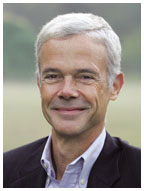
|
|
November 16, 2005: A moment with...
(John Troha/Black Star) |
Frank O’Donnell ’73
To understand why Frank O’Donnell ’73 has become an influential environmentalist in Washington, D.C., one only has to read what classmate Ronald C. Fondiller, then editorial editor of The Daily Princetonian, wrote about his 1972 performance in Gilbert and Sullivan’s Iolanthe. “In a play which calls for hams, O’Donnell is a prime cut,” Fondiller wrote.
Now 54 and president of the advocacy group Clean Air Watch, O’Donnell regularly makes news with his cutting remarks about the Bush administration’s approach to air quality. A former journalist, O’Donnell alerts reporters to behind-the-scenes bureaucratic maneuvering as well as the latest research on how air pollution affects public health. He spoke to Juliet Eilperin ’92, who covers the environment for The Washington Post. Her book, Fight Club Politics: How Partisanship Is Poisoning the House of Representatives, will be published in the spring.
Is it depressing being an environmentalist in the current political climate?
It’s an obvious challenge right now, given that the Bush administration is willing to do positive things on the environment only to the extent that its industry backers permit it. ... You absolutely have to have a sense of humor or you will become embittered.
How does pushing for environmental reforms now compare to working on these issues in the past?
Nowadays, with single-party government, it becomes harder to shine a light on some of these problems because you don’t have the same kind of government oversight hearings and investigations. Also, they’ve learned how to talk a better game.
How do you view the media in the context of this fight?
I tend to think the media is the only hope of being a line of defense against the alliance of big government and big corporate interests. The media is my principal constituency.
Why did you choose air quality as your environmental cause?
Maybe it’s a tiny slice of something where I could make a difference. It’s the one area that’s got the biggest stakes, financially. [The industries that generate air pollution are] a multi-multi-multi-billion-dollar operation. It affects everyone’s life in one way or another.
What has been your most satisfying environmental win?
Back in the late ’90s, the Environmental Protection Agency was debating how to lower the sulfur content in auto emissions. The EPA people were too intimidated to take it on. They said it couldn’t be done. Working with [clean air advocate] Bill Becker, we put together a back-of-the-envelope study that showed you could lower the sulfur content of gas in a way that was equivalent to taking 54 million cars off the road. The EPA turned around and said, “We could do that.” The logic was inescapable.
And what was your worst moment?
When I was working with EPA officials [on reducing sulfur in diesel fuel, in the spring of 2004] and basically they told us, “This is as far as we’re going to go because the oil companies won’t go any further.”
In the wake of rising gas prices, President Bush has urged Americans to conserve energy by driving less and taking advantage of public transportation. What do you think of this message?
The idea of saving energy is a good one. But it won’t mean much unless coupled with changes in policy — for example, better fuel-economy standards. In that regard, the administration is guilty of hypocrisy because it still opposes needed policy changes.
You get along with some of your political adversaries — in fact, you attended the 40th birthday party of Scott Segal, the chief lobbyist for the nation’s electric utilities. How do you manage to maintain a friendly working relationship with your opponents?
It’s a product of being a certain age, perhaps. I don’t really come at this with a self-righteous attitude. [Lobbyists] are creatures of Washington, trying to make a living, and they’re part of the Washington system.
You transferred to Princeton midway through your college career. What was your college experience like?
I was never part of the club scene, or bickering. ... The theater group I founded was the Princeton Gilbert and Sullivan Society, which despite its main focus on 19th-century comic opera was definitely a non-establishment outfit. I used to fight with the University for space all the time.
Most Princetonians go on to earn fairly generous salaries, but you’re not in that camp. Why do you think you’ve pursued a different path?
I’ve never based any major decision in my life on a salary. In
fact, four times I’ve changed jobs to go to a lower salary. ![]()

